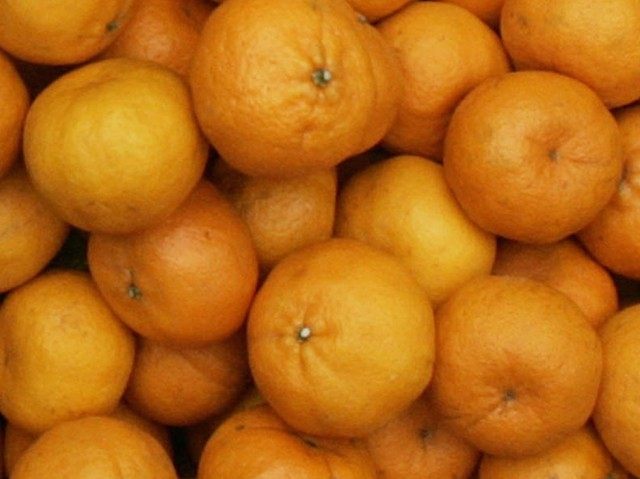The increasingly bitter labor strife at West Coast ports between employers represented by the Pacific Maritime Association (PMA) and members of the International Longshore and Warehouse Union (ILWU), whose members command average wages and benefits of about $1,200 a day, is causing California’s agricultural sector to watch its labors rot away.
February is traditionally a slow month for international trade, but it is normally a big month for agricultural exporters. Yet this year deliveries of fresh fruit and vegetables that can easily spoil have been delayed by three to four weeks. For rice growers, the delay is up to eight weeks and involves 20% of this year’s entire export crop.
The hardest hit sector appears to be California’s $1 billion in annual citrus exports of perishable oranges, lemons and limes that predominantly flow every February and March toward Korea, Japan, China and Australia.
Sun Pacific Shippers and Farming, the largest navel orange grower in California and largest kiwi grower in the United States, normally ships 350 containers of fruit worth $6 million a week this time of year. Sun Pacific’s President Al Bates told the San Francisco Chronicle that port delays have cut exports in half. The pain for growers is especially high, given that farmers are already paying premium prices for water during the current drought.
The back-up at the ports is forcing growers to leave fruit on the trees longer in an attempt to avoid rot. Bates warned that “The warm weather is really bad,” because orange peels thin out and the fruit becomes mushy in the heat. He said the 80-degree weather in the first part of February is the worst he has experienced in his career.
Tim Johnson, President and CEO of the California Rice Commission, which represents the state’s 2,500 rice farmers, said regarding the port issue, “It’s been devastating.” He told the Sacramento Business Journal that “Everything is very congested.” He worries that delays “mean that we don’t make shipments that we anticipate now through summer 2015.”
Johnson warned that export backlogs will also hurt domestic production. The containers holding rice for export that have been piling up at ports since December would normally be freed up for domestic shipments. With warehouses are now overflowing, domestic customers may soon turn to foreign imports to meet their demand.
The union port fight is hammering other workers in the agricultural supply chain. West Sacramento-based Devine Intermodal, which moves cargoes by truck for Farmer’s Rice Cooperative, Blue Diamond Growers and other California growers to the Port of Oakland, began cutting hours for a quarter of his 25 workers on Friday.
Breitbart News recently reported that America’s best-paid union members caused a four day shut-down of the 29 West Coast ports during Thursday, Saturday, Sunday and Monday, when about 80% of heavy crane operators called in sick last week. It seems that the union members were trying to force employers to pay double-time for catch-up work on the four union contract holidays for “Lincoln’s Birthday” and “President’s Day.”
Employers represented by the Pacific Maritime Association (PMA) said that members of the International Longshore and Warehouse Union (ILWU) had successfully slowed down loading and unloading at the Los Angeles and Long Beach ports, to the point that weekly crane operator shifts fell from about 100 shifts in November to fewer than 20 in January.
Under the union contract, employers are forced to pay 50% to 100% on top of normal wage rates as “premium pay”. The PMA said it suspended its West Coast operations to prevent the union from gaming the contract to force employers to pay the maximum amount of overtime and double-time pay.
Wade Gates, PMA spokesman for the Port of Los Angeles, said in a statement published on the employer’s web site that number of ships anchored waiting to enter the ports of Los Angeles and Long Beach had spiked to 32 from 20 last week, versus zero at this time last year. Gates complained, “What they’re doing amounts to a strike with pay, and we will reduce the extent to which we pay premium rates for such a strike.”
With rotting crops and losses mounting, the Obama Administration dispatched U.S. Labor Secretary Tom Perez to California try to broker an agreement between shipping companies and dockworkers along the West Coast, the White House said on Saturday.
Harry Bridges, who organized the ILWU in 1930 and ran it for the next 60 years, was an ardent Marxist and staunch supporter of the Soviet Union until his death in 1990. Despite being an alleged member of the Communist Party of the United States’ Central Committee in the 1930s, he is celebrated by the likes of House Democrat leader Nancy Pelosi, who once said, as Speaker of the House, that “Harry Bridges led the struggle for worker’s dignity.” Bridges replied to complaints about his union’s violent tactics: “I’m a machine man, and I head a machine.”
The ILWU members became the highest paid union workers on the face of the planet because they could threaten spectacular financial and job losses across America by slowing down movements at all of the 29 West Coast ports they control. But for the first time, they may have over-played their negotiating position. The PMA and ILWU held their first face-to-face bargaining session in a week on Thursday with the port shuttered.

COMMENTS
Please let us know if you're having issues with commenting.